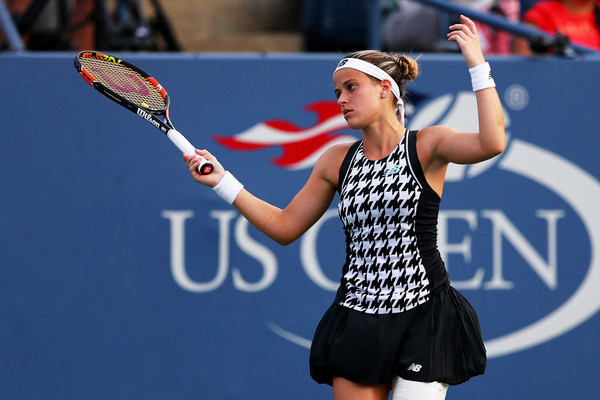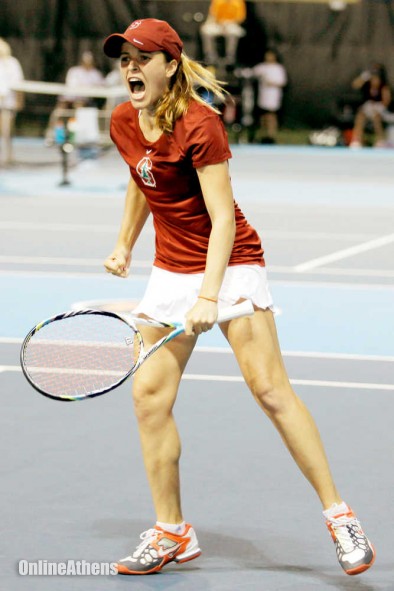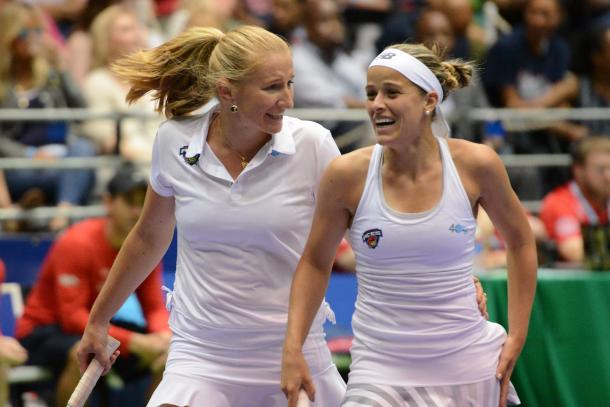2015 was a learning experience in many ways for Nicole Gibbs. The 22-year-old Stanford alumna had a rocky season filled with an abundance of ups, downs and professional changes. Still trying to figure out life as a professional tennis player, Gibbs ended her 2015 season with a 28-30 (.483) win-loss record, a statistic she had worked hard to improve after holding a poor 11-24 record in late September.
Sitting down with VAVEL USA for an exclusive interview, Gibbs was rather reflective on her 2015 season, admitting she struggled emotionally with her confidence and game for a long period of time – consequently forcing her to make a number of professional changes.
“2015 was a very challenging season,” she said.
After losing in the second round of the Australian Open to fellow WTA Rising Star Elina Svitolina, Gibbs’ form seemed to go downhill. Winning just three matches in a span of six months, the American was in dire need of a professional change, as well as a change in mentality.
“After a decent January, I went through a 6-month period where I really struggled with my confidence and my game. After several coaching changes, a racquet change, and a recommitment to the process of improving, my new coach Roger Smith and I were able to put together a great end to the season.”
“Although February through August left a lot to be desired for me, I'm really proud of the way I was able to rebound.”
For any athlete, losing can be the motivation one needs to continue improving, but being on the losing side of a match week after week can begin to take its toll on any individual psychologically. Doubts begin to creep in. Confidence is lost. Suddenly, the motivation and fire to be better than you were yesterday begins to fade.

Nicole Gibbs reacts to missing a shot during her second round match at the 2015 U.S. Open. (Photo courtesy: Elsa/Getty Images North America)
Gibbs was very open about the doubts she faced throughout her arduous 2015 season, but still made sure she was realistic with herself about her chances while competing at a high level.
“I think everyone has doubted themselves at one point in their life, regardless of career choice,” the 22-year-old said. “Several times, I had to ask myself if what I was capable of was going to get me to the level I want to achieve.”
“That's when you really need a strong team around you who believes in what you're doing and shares your vision. Finding that this fall, I think I was able to recommit myself to a more positive attitude and a stronger sense of self-belief.”
In order to restore some of the confidence she had lost between February and August, Gibbs went back to playing a number of ITF Pro Circuit events across the United States in late September. At that level, she was able to reach two finals, but never got her hands on the winner’s trophy. Nonetheless, she was still able to find some of the confidence she had been lacking, which was a major relief after such a rocky 2015 season.
When asked what she thought was the biggest difference between playing on the WTA as opposed to the ITF Pro Circuit, Gibbs said, “I think in order to reach the WTA level, you have to be solid on every front. At the ITF level, you might be able to get away with competing well even if you don't have a real weapon. Similarly, there are players who are incredible ball strikers but don't handle pressure or play the big points as well.”
“That's not to say that players at the WTA level don't have weaknesses, but if they do they are generally offset by an outstanding weapon.”

Nicole Gibbs won four NCAA titles during her time at Stanford University. (Photo courtesy: AP)
Shifting gears slightly – a couple of years ago, Gibbs played college tennis for Stanford University. Prior to graduating in 2013, she played as the number one singles and doubles player in the NCAA Division I and won an unprecedented four NCAA titles.
“College tennis prepared me for life on tour by teaching my how to live a balanced life while still committing to my tennis,” she said. “I had to learn how to prioritize whatever was most important, school or tennis, while also maintaining a social life to keep me happy and well-rounded.”
“It was a good lesson to learn because it's not always easy to keep balance in your life on tour!”
Because of her many successes in collegiate tennis, Gibbs was forced to manage her time wisely in order to balance the books with the ball.
“It's about prioritizing whichever is more important at a given time. If I'm in the middle of NCAA's, I might have to cut some corners in school. If I'm in the middle of finals, I might have to skip a weekend practice. Giving my ‘80%’ to whichever was more important at a given time made it possible to succeed in both.”
However, being amongst the best at what you do on a national level has certain perks. Back in 2012, Gibbs was awarded a wildcard into the main draw of the Bank of the West Classic by her university, in recognition of her achievements at the NCAA level. After beating Thai qualifier Noppawan Lertcheewakarn in the first round, the WTA Rising Star was given the daunting task of playing reigning Wimbledon champion and Olympic gold medallist Serena Williams.
For every tennis fan, the thought of looking across the net and seeing Serena Williams is intimidating enough, but physically trying to keep up with her shot-for-shot is a totally different ball game.
When asked if there is anything she does to block out the fact that she’s playing a multiple Grand Slam champion, Gibbs answered, “At the end of the day, you can't really just ‘block out’ the fact that your opponent is Serena, a player who you've watched on television for years and years and who has won countless Grand Slams. What you have to do in those situations is focus on the actual tennis as best you can, rather than the broader situation of playing a legend.”
Fast forward to 2015 – amidst all of her struggles professionally, Gibbs was given the opportunity to play Mylan World TeamTennis for the Austin Aces, alongside former world number one Andy Roddick. This past season, the Aces made a surprise run to the final, winning the Western Conference – the first in the league’s 40 year history.
Nicole Gibbs and Austin Aces teammate Alla Kudryavtseva both made their Mylan WorldTeam Tennis debut in 2015. (Photo courtesy: Christopher Levy)
“I loved [World TeamTennis],” she said, happily. “It was a great way to get matchplay with some of the best players on tour and the fans were awesome!”
Outside of tennis, Gibbs considers herself a big NFL and NBA fan. Even though she got into football after developing friendships with guys on the football team during her time at Stanford, the American still considers herself a big Cleveland Cavaliers and LeBron James fan.
Heading into the 2016 season, Gibbs has a completely different mindset, one that is both motivating and realistic, given her struggles in 2015.
“I don't love to make ranking goals because I want to focus my efforts on the controllable things, like improving my game,” the 22-year-old said. “That said, ending the year top 50 would be a really big stepping stone in my career.”
Currently ranked number 109 in the world, the American will likely miss out on a spot in the main draw of the 2016 Australian Open if none of the players that precede her in the rankings withdraw. As a result, she will be forced to play qualifying in order to earn a spot in the main draw.
Australia is known for their brutal, dry heat during their summer months, but how does a player physically prepare for such gruelling conditions?
“Getting there beforehand is key,” Gibbs said. “But I try to increase my endurance through cross training and on court fitness. A trip to hot yoga class is always great too.”
At the age of 22, Gibbs still has plenty of time to make her mark on the WTA. Like all athletes, the American wants to look back at her career, when she retires, knowing that she did the best she could as a competitor in the face of adversity.
“I want to look back and know that I maximized my abilities and gave myself the best possible shot at greatness.”
“For me, achieving my personal best is always the end game.”










































